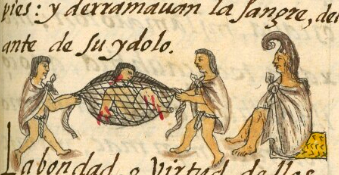tematlapatzca (FCbk10f132r)
This iconographic example, featuring a deceased captive, a person who was crushed in a net (tematlapatzca, a verb), is included in this digital collection for the purpose of making comparisons with related hieroglyphs. The term selected for this example comes from the keywords chosen by the team behind the Digital Florentine Codex. There is no gloss. But a similar verb is mecapatzca, which appears in the nearby text. This example shows two men carrying a bloody, deceased man, who is caught in a net. He is a captive whose destiny was to be given as an offering to the deity named Coltzin. The contextualizing image shows Coltzin to the right of the sacrificial scene, sitting on a woven mat (petlatl), wearing a hide cape, and having a hairstyle where his long hair is swept up into a huge curl above his forehead. The culture group here, according to the text, involved the Toloca, Matlatzinca, or Cuacuata (plural ethnic labels in this case). The text explains that they did not generally speak Nahuatl, although there were some Nahuatl speakers among them. The Toloca got their name from the abundance of reeds (toli) in the region.
Stephanie Wood
The Matlatzinca culture group has the term for net (matlatl) at its root. The Toluca Valley had a large lagoon where the local people fished with nets. Nets of the type they used are found regularly in Nahuatl hieroglyphs. A few examples appear below.
Stephanie Wood
1577
Jeff Haskett-Wood
micquetl, micqui, mictiloni, teomicqui, teana, malli, matlatl, mecatl, dead, muerte, morir, sangre, sacrificar, tlamictiliztli, tlacamictiliztli, human sacrifice, huentli
tematlapatzca, to crush someone in a net, https://nahuatl.wired-humanities.org/content/tematlapatzca
mecapatzca, to crush someone in a net or rope, https://nahuatl.wired-humanities.org/content/mecapatzca
aplastar a alguien en una red
Stephanie Wood
Available at Digital Florentine Codex/Códice Florentino Digital, edited by Kim N. Richter and Alicia Maria Houtrouw, "Book 10: The People", fol. 132r, Getty Research Institute, 2023. https://florentinecodex.getty.edu/en/book/10/folio/132r/images/0 Accessed 2 October 2025.
Images of the digitized Florentine Codex are made available under the following Creative Commons license: CC BY-NC-ND (Attribution-NonCommercial-NoDerivs 4.0 International). For print-publication quality photos, please contact the Biblioteca Medicea Laurenziana ([email protected]). The Library of Congress has also published this manuscript, using the images of the World Digital Library copy. “The Library of Congress is unaware of any copyright or other restrictions in the World Digital Library Collection. Absent any such restrictions, these materials are free to use and reuse.”




